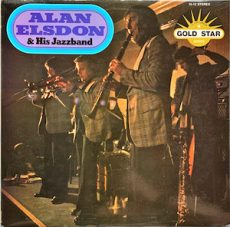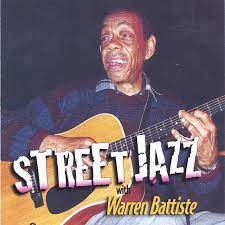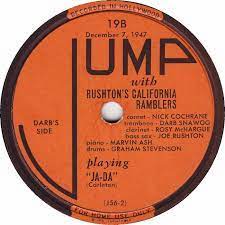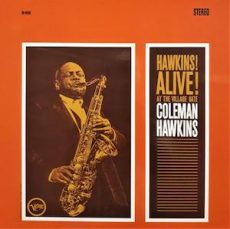
Daily Dose Of Jazz…
Brian Leake was born November 9, 1934 in South Wales, Wales. He first played the clarinet in Mike Harris’ jazz band while studying architecture. After completing his military service, he moved to London, England where he worked full-time as a salesman. He was also active in the British trad jazz scene from the early 1960s and his first recordings were made in 1962 with Mick Mulligan and George Melly on At the Jazz Band Ball.
He also played with Dick Charlesworth on P&O ships and in 1964 he appeared on the BBC program Jazz Club with Charlesworth and His City Gents. By the end of the decade it was owned by Alan Elsdon & His Jazz Band. Leake led a mainstream jazz sextet called Sweet & Sour with the bassists Paul Bridge and Ron Rubin were members. He led the Al Fresco Marching Band, in which he played alto saxophone.
He was involved in recordings by The Nottingham Barbers’ Shop Quartet and singer Clinton Ford. Recordings of Leake’s BBC radio appearances from 1979 to 1990 appear on the album Benign Jazz. As a pub pianist, he appeared in an episode of the television series Nick Lewis, Chief Inspector .
Pianist, saxophonist, clarinetist Brian Leake, who composed traditional jazz, transitioned on November 10, 1992.
More Posts: bandleader,clarinet,history,instrumental,jazz,music,piano,saxophone

Three Wishes
When Nica queried Budd Johnson as to what he would wish if given the opportunity to have three wishes granted and he related this to her:
-
- “That’s a very good question. First of all, I would love to play my instrument – I mean, give it all I have to give. I would love to get recognition. And play my horn the way I know I could – and it’s just me, the reason, if I don’t! I would really love to play as well as I think I can.”
- “This may sound very corny, but I have a very wonderful wife, and I would like to make her very happy. The only way I think I could do this is: get with that instrument and really play it, so I could make the money to do the things I want to do for her.”
- “I want recognition amongst my friends. I crave sincere friendship. I do have a lot of friends, but I think this might bring us closer together. I seem to have lost track of all them. I had to go my way, reasons… everybody had to do what they had to do.
This is how you get separated. When I used to live up to 152nd Street, They all used to come up to my house, Monk, Bird. They all used to come by and we exchange ideas, and they would say, ‘Write this down for me.’ They would hum it, and I would write it down. They remember my son when he was a little baby in the crib! And I miss all of them.
The reason I put that first is that if I were able to master the horn – I guess nobody can have all this – I would have all my friends, be able to visit them, and be around. I have a lot of dear friends who have gone to the top. And they still like me. But they are busy and I am still scuffling! It’s a funny thing. The better you get, you travel in different circles, automatically. I hope someday to attain all this. This is all I know, the music. All this is one thing.”
*Excerpt from Three Wishes: An Intimate Look at Jazz Greats ~ Compiled and Photographed by Pannonica de KoenigswarterMore Posts: baroness,clarinet,history,instrumental,jazz,music,pannonica,saxophone,three,wishes

Daily Dose Of Jazz…
Warren Battiste was born on November 8, 1925 in New Orleans, Louisiana and was taught to play the guitar by his father, a banjoist at Preservation Hall. He took four years of instruction at Greenwald Music School in his hometown. Performing at a number of jazz clubs on Bourbon Street, he appeared in the film Shy People with Jill Clayburgh and Barbara Hershey.
As an educator Battiste taught music at Wequachie High School, Essex County College and the Newark Art Center in Newark, New Jersey. He has performed with George Benson, The Platters, The Inkspots, Frank Foster, Barry Harris, Woody Shaw and Illinois Jacquet, among others. Releasing his debut album Street Jazz in 2001, recorded his sophomore release Just Friends three years later and then his album Quiet Storm in 2007.
Guitarist Warren Battiste, who also plays bass, banjo and piano, has received the Lifetime Achievement Award in Jazz from the New Orleans Jazz and Heritage Festival, and was selected as a Jazz All Star in 2000 from New Orleans Magazine.
More Posts: bandleader,banjo,bass,guitar,history,instrumental,jazz,music,piano

Daily Dose Of Jazz…
Joe Rushton was born in Evanston, Illinois on November 7, 1907. He started out playing clarinet and all of the other standard saxophone varieties, and was occasionally recorded with these other instruments. Settling on the bass saxophone, through the early to mid Forties he worked with Ted Weems, Jimmy McPartland, Bud Freeman, Floyd O’Brien, Benny Goodman, and Horace Heidt.
Joining Red Nichols’s Five Pennies in 1947 became a musical relationship and collaboration that went well into the early 1960s. He recorded six sides for Jump Records in 1945/47, but otherwise appears on record only as a sideman.
Bass saxophonist Joe Rushton, who is one of the best-known jazz performers to concentrate on bass saxophone, aside from Adrian Rollini, which he played from 1928. transitioned on March 2, 1964, in San Francisco, California at the age of 56.
More Posts: bandleader,history,instrumental,jazz,music,saxophone

Requisites
Hawkins! Alive! At The Village Gate ~ Coleman Hawkins | By Eddie Carter
This morning’s choice from the library takes us to The Village Gate for two performances on August 13 and 15, 1962 by The Coleman Hawkins Quartet. Hawkins! Alive! At The Village Gate (Verve Records V-8509/V6-8509) hit the stores in 1963 and is the companion to Hawkins! Eldridge! Hodges! Alive! At The Village Gate. It was also recorded on August 15 with special guests Roy Eldridge and Johnny Hodges. Hawk was one of the greatest musicians during the Swing Era and a commanding presence on the tenor sax throughout his career. Hawk’s joined on stage by Tommy Flanagan on piano, Major Holley on bass, and Ed Locke on drums. My copy used in this report is the 1995 Classic Records US Stereo Audiophile reissue sharing the original catalog number.
Side One opens with All The Things You Are by Jerome Kern and Oscar Hammerstein II. Tommy lays the foundation on a concise introduction leading to Coleman’s melody and lively lead solo possessing one imaginative idea after another. Tommy matches him in agility on a spirited reading. Major follows with a splendid statement leading to Coleman’s return for the theme’s reprise. Hawkins introduces the next tune to the audience, the African American spiritual, Joshua Fit The Battle of Jericho. Hawk takes the lead on the theme, stepping aside for Flanagan who gives a marvelous first solo. Holley makes his presence felt on a strong, personal interpretation vocally accompanying his bass playing. Hawkins puts an exclamation point on the finale preceding the group’s climax.
The quartet starts Side Two with the old favorite, Mack The Knife by Kurt Weill, Bertolt Brecht, and Marc Blitzstein. After the ensemble’s melody presentation, Coleman lets us know we’re in for a treat with a joyful opening solo. Tommy delivers a cheerful interpretation next, then Major gets a chance to shine on a charming reading ahead of the closing chorus. The album ends with a lovely ballad, It’s The Talk of The Town by Jerry Livingston, Al J. Neiburg, and Marty Symes. Hawk opens this standard with a warm, moving melody that continues in the poignant beauty of his opening statement. Flanagan follows with a touching interpretation of his own, and Holley manages the next reading with great delicacy. Hawk reappears and gently takes the group home to appreciative applause from the crowd.
Hawkins! Alive! At The Village Gate was produced by Creed Taylor. Frank Greenwald and Tom Hidley were the men behind the dials of the original recording. This Classic Records reissue was mastered by Bernie Grundman and pressed on 180 grams of audiophile vinyl that’s dead silent until the music starts. The sound quality is breathtaking with a stunning soundstage placing the listener in the Village Gate crowd while the musicians are performing. Coleman Hawkins recorded forty albums as a leader for various labels and appeared as a sideman with some of the elite musicians in jazz. He passed away at age sixty-four from liver disease on May 19, 1969. If you’re a fan of his LPs, the tenor sax, or just love good jazz, I invite you to check out Hawkins! Alive! At The Village Gate the next time you’re out searching for vinyl treasure. Like its companion, it’s a great album that’s perfect to enjoy with your favorite beverage after a long day or week, and a record any jazz aficionado or novice fan can enjoy!
~ Hawkins! Eldridge! Hodges! Alive! At The Village Gate (Verve Records V-8504/V6-8504) – Source: Discogs.com ~ All The Things You Are, It’s The Talk of The Town, Mack The Knife – Source: JazzStandards.com © 2022 by Edward Thomas Carter
More Posts: choice,classic,collectible,collector,history,instrumental,jazz,music,saxophone



